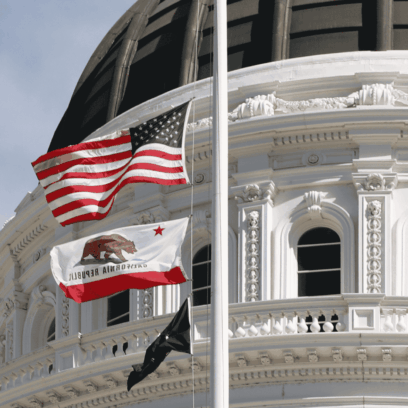Our Takeaways From GreenBiz ’24


As climate-related disclosure and mitigation requirements continue to evolve, understanding the latest regulatory landscape is essential for US companies. In this webinar, we cut through the jargon to provide clear insights into emerging climate-related requirements, breaking down two key federal proposals and one EU regulation impacting some US-based companies. Join us to stay informed and prepared for what’s ahead in climate compliance.
Our GreenBiz ’24 recap highlights discussions on sustainability trends, regulatory expectations, and tackling Scope 3 emissions.
At GreenBiz ’24, our climate services team was excited once again to join a consociate of over 2,000 sustainability professionals to discuss the latest developments in the world of sustainability and decarbonization. There were discussions about advancements in regulatory support (SB 253 and 261) and anticipated SEC rules, as well as about industry-wide challenges such as greenhushing and Scope 3 emission estimation. Emphasis was placed on pragmatic solutions to tackle challenges across supplier engagement, employee communication, and consumer education. Several sessions focused on carbon offsets and the burgeoning efforts to evaluate the quality of and provide further stamps of approval for nature-based projects. Finally, there was a general acknowledgement by United States (US) companies that they need to prepare for upcoming regulations. Overall, the conference was highly productive, filled with engaging discussions, and featured many insightful speakers with diverse viewpoints. Below are some of the more important highlights that our team took away from GreenBiz 24.
The day when understanding, measuring, and reporting environmental impact becomes mandatory for all is fast approaching.
The European Union’s (EU) Corporate Sustainability Reporting Directive (CSRD) is already in effect, impacting companies not only within the EU but also those outside its borders. Large companies, even those based outside of the EU, fall under its purview if they meet two of the following three conditions: €40 million in net turnover, a balance sheet total of more than €20 million, or more than 250 employees. In addition, non-EU companies with a turnover of above €150 million in the EU must also comply, and if CSRD is applicable to you, a double materiality assessment is a requirement which you need to fulfill. The US Securities and Exchange Commission (SEC) rules are expected to arrive by mid-2024, focusing initially on Scope 1 and 2 emissions while likely leaving out Scope 3 for now. With all the regulations currently in place or on the horizon, definitively or as a possibility, the challenge remains around standardization as the requirements for each are different and thus require companies to identify, measure, and report different data at varying levels of detail. Even companies that may not be subject to regulatory reporting often consider it to gain a competitive advantage because their customers, investors or other stakeholders care.
Companies are beginning not only to estimate Scope 3 emissions but also to devise practical ways to reduce them.
Tackling Scope 3 emissions remains a significant challenge; however, companies are increasingly allocating time and resources to address them. Only about 50% of large companies (according to an Ecovadis report) track and publicly report greenhouse gas (GHG) emissions, a figure that drops to less than 10% for small and mid-sized businesses. Nonetheless, this number is expected to rise as regulations around sustainability and decarbonization become more stringent.
While companies continue to use a spend-based approach to identify hotspots, detailed process-level assessments are being performed for priority categories, along with Life Cycle Assessments (LCAs) being conducted on key products. Within the Consumer Packaged Goods (CPG) and health/beauty sectors, a significant portion of environmental impact is driven by Scope 3, necessitating a robust approach to address them.
Typical strategies to reduce Scope 3 emissions include internal policy changes, supplier engagement, customer engagement, and product innovation. Scope 3 reporting requirements are evolving rapidly.
“Only about 50% of large companies (according to an Ecovadis report) track and publicly report GHG emissions, a figure that drops to less than 10% for small and mid-sized businesses.”
PANKAJ TANWAR, MANAGING Director OF CLIMATE SERVICES
Skip the RFP—CarbonBetter can help
CarbonBetter Certified Offset Portfolios allow carbon buyers to participate in a variety of projects, geographies, and technologies in one simple transaction rather than navigating a lengthy and complex RFP process with multiple carbon market participants.
Learn More about CBCO 22-1There is an overwhelming need to dispel critics and overcome greenhushing.
Amidst accusations of greenwashing, some companies are remaining silent on their sustainability-related efforts. However, there is an overwhelming belief that we should fight greenhushing, and that companies need to talk about sustainability and their progress. 85% of people worldwide want to hear from companies about their GHG emissions reduction efforts. 71% of people say their opinion would improve if they knew that a company is a leader in GHG emissions reduction. 45% of people in the US want to be seen as someone who buys eco-friendly products (10 years ago, this number was 33%).
Regulation is on the horizon, making it beneficial to develop a habit of voluntarily reporting disclosures. For companies which expect to come under purview of regulatory reporting requirements, this proactive approach can help you smoothly transition to more detailed reporting and potentially circumvent a range of challenges.
Carbon markets are evolving with the rising usage of technology to meet the increasing demand for carbon credits quality assurance.
The carbon markets are buzzing with changes. There’s increased interest in longer-term pre-issuance purchases, and with that, an increased understanding that for the market to scale effectively, firm buyers interested solely in their return on investment (ROI) are necessary to fill in what would otherwise be market gaps in the financeability of projects. The industry is also acknowledging that scrutiny has led to better outcomes. For example, the science of understanding above-ground and below-ground carbon storage has drastically improved ever since the recent probes. Multiple companies are announcing and developing methodologies to enhance the ability to assess the quality of nature based projects, from monthly monitoring of silviculture, to LIDAR usage, and assessments of regional timber markets.
Conclusion
With the world of sustainability continuing to evolve, keeping a pulse on changing requirements is a challenge that makes industry conferences like GreenBiz even more important. In this regard, GreenBiz 24 was a great success in providing insightful learning opportunities, enabling collaboration, and forging new friendships among sustainability professionals. Going forward, companies need to continue to expand their sustainability teams and rely on third-party support to ensure they address risks associated with climate change and remain on track to meet their climate goals.
Need help? No matter where you are in your sustainability journey, we're here to help. Contact us today to learn more.
The discussions at GreenBiz '24 highlighted upcoming regulatory changes including the EU’s Corporate Sustainability Reporting Directive (CSRD) and anticipated updates from the US Securities and Exchange Commission (SEC) focused on emissions reporting.
The conference outlined several strategies for addressing Scope 3 emissions, including enhancing supplier engagement, improving data collection and analysis for better emissions estimation, and investing in sustainable product innovations. Collaborating across the value chain was emphasized as a key approach to effectively reducing Scope 3 emissions.
When selecting carbon offset projects, it’s important to prioritize those with clear, verifiable impacts and those that align with broader environmental and social goals. If possible, seek projects that are backed by rigorous standards and third-party certifications to ensure their quality and effectiveness.

About the Author
Pankaj Tanwar is Managing Director of Climate Services at CarbonBetter. He has experience leading Fortune 100 companies through their sustainability journeys, including sustainability driven growth in the food industry. Pankaj holds an MBA from Northwestern University’s Kellogg School of Management and a BTech in Mechanical Engineering from the Indian Institute of Technology, Kanpur.

About the Author
Della Jung is Director on CarbonBetter’s sustainability, decarbonization, and climate division. She brings extensive experience in private equity and infrastructure investing, fund operations, climate and sustainability strategy to help deliver effective solutions inclusive of both financial results and social impact for her clients. Based in Washington, D.C., Della holds a BA in Government from Dartmouth College.


